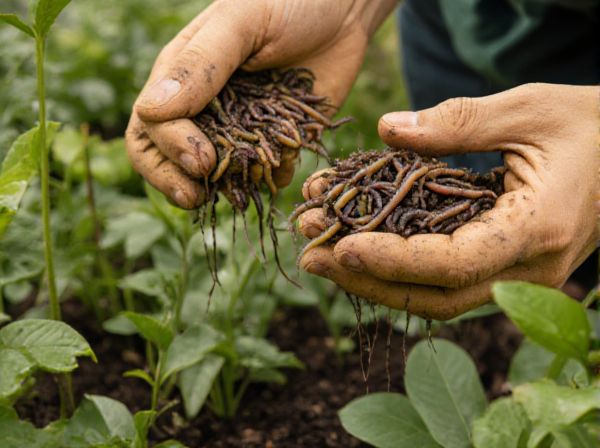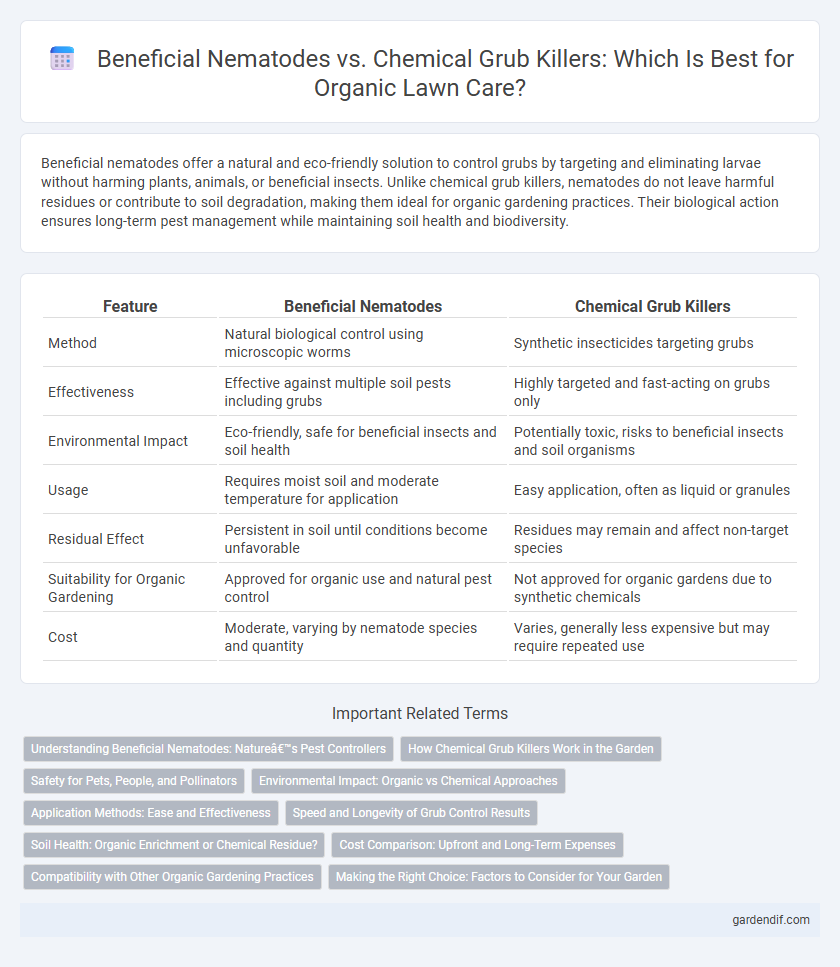
Beneficial nematodes vs Chemical grub killers Illustration
Beneficial nematodes offer a natural and eco-friendly solution to control grubs by targeting and eliminating larvae without harming plants, animals, or beneficial insects. Unlike chemical grub killers, nematodes do not leave harmful residues or contribute to soil degradation, making them ideal for organic gardening practices. Their biological action ensures long-term pest management while maintaining soil health and biodiversity.
Table of Comparison
| Feature | Beneficial Nematodes | Chemical Grub Killers |
|---|---|---|
| Method | Natural biological control using microscopic worms | Synthetic insecticides targeting grubs |
| Effectiveness | Effective against multiple soil pests including grubs | Highly targeted and fast-acting on grubs only |
| Environmental Impact | Eco-friendly, safe for beneficial insects and soil health | Potentially toxic, risks to beneficial insects and soil organisms |
| Usage | Requires moist soil and moderate temperature for application | Easy application, often as liquid or granules |
| Residual Effect | Persistent in soil until conditions become unfavorable | Residues may remain and affect non-target species |
| Suitability for Organic Gardening | Approved for organic use and natural pest control | Not approved for organic gardens due to synthetic chemicals |
| Cost | Moderate, varying by nematode species and quantity | Varies, generally less expensive but may require repeated use |
Understanding Beneficial Nematodes: Nature’s Pest Controllers
Beneficial nematodes are microscopic roundworms that naturally target and eliminate soil-dwelling pests such as grubs, offering an eco-friendly alternative to chemical grub killers. These nematodes penetrate the pest's body and release bacteria that kill the host within 48 hours, promoting healthier soil without harmful residues. Unlike chemical treatments, beneficial nematodes degrade quickly in the environment, supporting sustainable pest control and maintaining ecological balance in organic gardening.
How Chemical Grub Killers Work in the Garden
Chemical grub killers eliminate pests by releasing synthetic insecticides that target the nervous system of grubs, causing paralysis and death. These substances persist in the soil, effectively reducing grub populations but potentially harming beneficial organisms and disrupting soil health. Unlike organic solutions, chemical treatments provide rapid results but may contribute to environmental imbalance and resistance development.
Safety for Pets, People, and Pollinators
Beneficial nematodes offer a safe, organic alternative to chemical grub killers by targeting larvae without harming pets, humans, or pollinators such as bees and butterflies. These microscopic organisms naturally control grub populations without introducing toxic residues into the soil or environment. Chemical grub killers often contain harmful pesticides that pose risks of poisoning and environmental damage, making nematodes a preferred choice for organic pest management.
Environmental Impact: Organic vs Chemical Approaches
Beneficial nematodes provide an eco-friendly solution to grub control by naturally targeting pest larvae without harming non-target organisms or polluting soil and waterways. Chemical grub killers often contain toxic pesticides that can disrupt soil microbiomes, contaminate groundwater, and harm beneficial insects like bees and earthworms. Organic methods using nematodes support sustainable agriculture by preserving biodiversity and maintaining long-term soil health compared to the adverse environmental impacts of conventional chemical treatments.
Application Methods: Ease and Effectiveness
Beneficial nematodes are applied as a liquid suspension sprayed directly onto the soil, ensuring even distribution and immediate contact with grubs, making the process environmentally safe and highly effective for organic gardeners. Chemical grub killers often require precise timing and soil moisture conditions, with granular or liquid formulations that may pose risks to non-target organisms and require cautious handling. The ease of application and targeted action of beneficial nematodes make them a preferred choice for sustainable pest management in organic gardening.
Speed and Longevity of Grub Control Results
Beneficial nematodes provide a natural, long-lasting solution for grub control by actively seeking out and parasitizing grubs within days, with effects sustained through multiple life cycles. Chemical grub killers often deliver rapid, visible results within a few hours to days but may require repeated applications to maintain control due to their limited residual activity. Choosing beneficial nematodes enhances soil health and provides prolonged grub suppression, while chemical options emphasize speed over longevity.
Soil Health: Organic Enrichment or Chemical Residue?
Beneficial nematodes enhance soil health by naturally controlling grub populations without leaving harmful chemical residues, promoting organic enrichment through increased microbial activity and nutrient cycling. Chemical grub killers, while effective, often introduce toxins that can disrupt soil ecosystems, reduce beneficial organisms, and lead to long-term soil degradation. Choosing beneficial nematodes supports sustainable soil management by maintaining biological balance and improving soil structure.
Cost Comparison: Upfront and Long-Term Expenses
Beneficial nematodes offer a cost-effective solution with lower upfront expenses compared to chemical grub killers, which often require multiple applications, increasing their long-term costs. Organic methods like nematodes reduce the risk of chemical resistance and environmental damage, potentially saving money on soil rehabilitation and health treatments. Over time, investing in beneficial nematodes supports sustainable pest control that minimizes recurrent costs associated with synthetic chemicals.
Compatibility with Other Organic Gardening Practices
Beneficial nematodes seamlessly integrate with other organic gardening practices such as composting, crop rotation, and the use of organic mulches, enhancing pest control without disrupting soil health. Unlike chemical grub killers, which can harm beneficial insects and soil microorganisms, nematodes maintain ecological balance by targeting specific pests only. This compatibility supports sustainable gardening efforts by promoting biodiversity and long-term soil vitality.
Making the Right Choice: Factors to Consider for Your Garden
Beneficial nematodes offer a biodegradable, non-toxic solution to controlling grubs, preserving soil health and promoting beneficial insect populations unlike chemical grub killers, which may leave harmful residues and disrupt garden ecosystems. Evaluating factors such as soil type, grub infestation severity, and long-term environmental impact helps in making an informed decision tailored to organic gardening principles. Prioritizing biological pest control methods aligns with sustainable gardening goals and reduces the risk of chemical resistance in pest populations.
Beneficial nematodes vs Chemical grub killers Infographic

 gardendif.com
gardendif.com